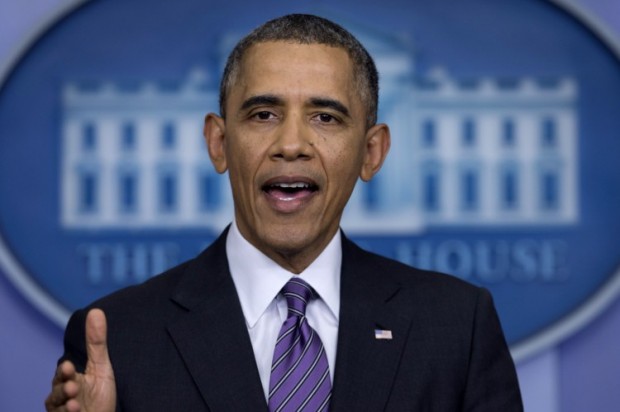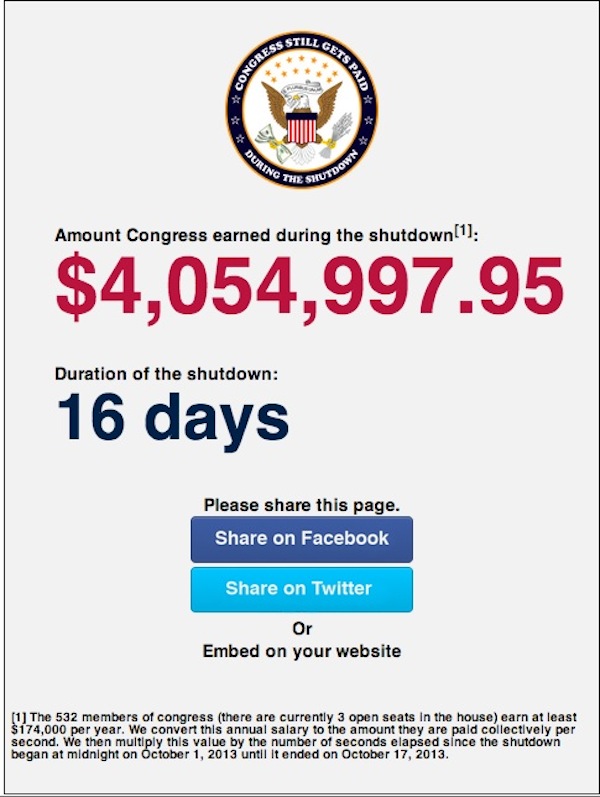Historically, May Day has provided us with an opportunity to celebrate workers across the globe. All forms of labor deserve recognition every day, but May Day reminds us to defend workers’ rights and acknowledge that every employee’s work contributes to shape and advance our society. Unfortunately, the GOP does not seem to agree as Senate Republicans filibustered a bill that gradually would raise the federal minimum wage from $7.25 to $10.10 on Wednesday, April 30th. This move is simply an extension of the “pull yourself up by your bootstraps” rhetoric that the U.S. Republican Party endorses to blame people for the (often structural) disadvantages they face instead of promoting equality.
The April 30th measure, that would have brought minimum wage earning workers a step closer to receiving a living wage, needed 60 votes to advance past the filibuster-proof threshold, but was defeated with a 54 to 42 vote. Disappointed by the results, President Obama commented, “We saw this morning a majority of senators saying yes [to the bill], but almost every Republican saying no to giving America a raise.” He also suggested that through their filibuster, Senate Republicans were telling U.S. workers “that you’re on your own without even looking them in the eye.”

via Salon
Senate Republicans are pretty darn happy with their decision to jeopardize people’s incomes, with some like Senator John Cornyn (R-Texas) claiming that raising the minimum wage would hurt more people than it would help. Swerve. I’m not really sure how giving people enough money to survive and to provide for their families hurts more people. In fact, there are a handful of benefits of increasing the minimum wage. If you want to ignore how increasing the minimum wage helps people who otherwise are forced to live below the poverty line simply because said people would have a chance to live above the poverty line, at least acknowledge that by putting more money in people’s pockets, you give them more money to spend and further stimulate the economy. Also, employers who do not pay their employees a living wage essentially force low wage employees to seek government assistance, thus burdening tax payers. Isn’t the GOP all about eliminating a “culture of dependency”? I would think if the GOP can’t defend a living wage out of a basic desire to see all people be able to afford at least food, education, and medical care, it would at least consistently support logic that furthers their agenda.
As if this filibuster wasn’t bad enough, one senator chose to add insult to injury. Senator Cornyn derided critics of the GOP’s stance by sarcastically suggesting, “It would be great if we lived in a world where Washington dictates what wages can be, and peace, love and happiness will break out, the Age of Aquarius, because Washington has somehow distributed free money.” Sen. Cornyn can have several seats because I’m sure he, as well as the majority of Senate Republicans, have had their share of “free money.” Remember the United States federal shutdown of 2013? You know, the one that negatively impacted federal programs and services that assist U.S. businesses and individuals by halting funding. Luckily for people like Sen. Cornyn, thanks to the 27th Amendment, which protects the salaries of Congress members from any changes in pay rate of until after an election in the House of Representatives, members of Congress still received their paychecks even though hundreds of thousands of furloughed federal workers went unpaid for weeks. Congress earned over $4 million in 16 days of a government shutdown brought on by none other than the GOP, but hard-working, low wage-earning employees can’t get $10.10 an hour.

via HuffingtonPost
No matter how much the GOP would like to endorse a system of beliefs that suggest that if you’re good enough and work hard enough, you’ll get the economic status due to you, racism, sexism, transphobia, homophobia, ablism, and of course classism directly impact how much money people can earn. I doubt that there are truly individuals in the U.S. who choose to earn unfair wages because it’s fun to struggle to put food on the table, afford healthcare, and pursue educational opportunities. That Senate Republicans can remain so divorced from the realities of poverty and still speak with the authority to justify denying people an opportunity for a better life and simultaneously insulting them by suggesting that people want the government to distribute “free money” is a reflection that some members of our society want other people to suffer because they benefit from the system as it is.
On the International Worker’s Day, let us remember that the U.S. economy privileges a very, very select group of individuals, and that our uplift is dependent on all workers receiving a fair wage. College-educated, blue-collar, white-collar, undocumented, sex, domestic, part-time, and full time workers (just to name a few), deserve a living wage, not the wage that’s most convenient to sustain the most affluent members of our society.



this makes me so angry i can’t even words
and i just realized that i’m about to be a minimum wage worker, which means this actually directly applies to me
Hopefully more American politicians take the same route as Seattle’s mayor:
http://www.reuters.com/article/2014/05/01/us-usa-washingtonstate-wage-idUSBREA400RD20140501
smh. As if these Republican senators will ever understand what life is like living with minimum wage.
How you are surprised by this? GOP are always to filibuster
Increasing the minimum wage by almost $3 is guaranteed to hurt workers. Much as companies like WallMart and McDonald’s are able to, and should pay their workers more than $7.25, people seem to forget that the majority of Americans working for minimum wage are doing so at small businesses. Many of these smaller businesses simply cannot afford to hire people at much more than $7.25, because they aren’t making much profit in the first place. So, when the minimum wage increases to $10.10 (which is a HUGE jump, perhaps to $8 or $8.50 the disemployment effects wouldn’t be so large), they have to either fire people or cut back their hours. This increases unemployment, and I think most people would agree that having a job at $7.25/hour is better than not having a job at all.
You could argue that the workers who won’t be fired as a result of the minimum wage increase will spend the extra money they earn to create a fiscal stimulus in their communities and offset these disemployment effects. And, if we were increasing the minimum wage to something more reasonable, that would probably be true and I would emphatically support the increase. But this is too much.
And, for the record, business owners are NOT the enemy in our society. The moguls at the top, sure, we can talk about taxing them – but independent business owners often have a hard time getting by too. The minimum wage hurts their businesses, and their employees.
If Autostraddle wants to publish stories about economic issues, please, for the love of God, find an economist to write them. There are queer, female, liberal economists – I’m one of them. But arguments like these are just factually incorrect.
Thanks for you comment Aly. First, I would like to say that I never claimed to be an economist and I don’t think I need to be an expert to have an *opinion* on a subject. Second, I don’t agree that this piece is “factually inaccurate”. Even though this piece contains my opinions, I did do my research and made my opinions accordingly. I’m not spewing out lies, but rather making opinions and assessments based on my research, which I cite throughout the article.
I googled “small businesses provide majority of minimum wage jobs” just now and all I found were articles stating that small business owners support the $10.10 federal minimum wage (like this one: http://thinkprogress.org/economy/2014/03/06/3373961/small-business-owners-minimum-wage-poll/). I will happily consider your point though about small business owners being hurt if you provide some evidence. Also, here’s a study that argues that increasing the minimum wage doesn’t reduce employment (http://www.raisetheminimumwage.com/pages/job-loss), just so you know where I’m coming from. Furthermore, I never claimed that independent business owners are the “enemy”. I did say that “employers who do not pay their employees a living wage essentially force low wage employees to seek government assistance, thus burdening tax payers.” I don’t see how that’s “factually inaccurate.”
If you don’t agree with my opinion, that is perfectly ok. I’m not here to convert you. (I provided links to sources that helped me form my opinion to be transparent about how I formed my ideas, not because I think you need to agree with me.) I whole-heartedly welcome other opinions, and I love learning from other people. If my opinion is problematic, I will be the first to apologize and take responsibility for my views. But, I don’t appreciate my work being called “factually inaccurate” if the basis for these “inaccuracies” are things I did not say. Your opinions are not fact just because you say them, and neither are mine.
Aly, in my opinion economists are not the only people who should write about the economy because much of their education is based on a faulty model. Please see the article by Jack Reardon: Time to redesign the conceptually flawed economics, and here is a link to an article by him with a different title: http://www.paecon.net/PAEReview/issue62/Reardon62.pdf
Ask yourself, why is the economy experiencing crisis after crisis and why have economists been unable to solve or prevent them from happening? Could it be that economists are contributing to the problems? Many of the people directly responsible for the 2008 crisis were economists and even professors at some of the elite Universities like Harvard. Here is just one source, but I am sure there are other more credible sources: http://www.economicpredictions.org/who-is-to-blame-for-the-financial-crisis.htm
I think one problem is the neoliberal policies (free-market, deregulation, privatisation, etc.) that are being implemented all over the world is adding massively to the problems of inequality and having low skill/low wage jobs instead of good quality/fair pay jobs. One problem is that corporate profits have become more important than human rights and corporations have become state-less and essentially ungovernable. Due to globalisation and these neoliberal policies, many jobs are being outsourced to other countries where poor people in developing countries are subjected to working in “sweat-factories/shops” and countries are forced to keep wages and taxes (especially for corporations) low to stay competitive.
Raising the minimum wage has problems, because it is possible that the cost of wage increases will be passed onto the poor again by increasing the cost of goods and services (like food, etc.). So for minimum wage increases to be effective, what is needed in my opinion, is to have a high, comparative minimum wage globally to stop the outsourcing of jobs and stop the exploitation of the poor, and to pay for it by increasing taxes on corporate profits and also by reducing the pay of top executives. No person deserves to be paid 400 times or more the income of someone else who works for the same company. See for instance the suggestions on the Wagemark website: https://www.wagemark.org/
Small business owners could be compensated by receiving tax cuts or other benefits dependent on the number of people they employ. The problem is that neoliberal policies and globalisation work against small businesses. For instance, this new trade agreement between Canada and Europe (CETA) that is in the works will have provisions that may include a ban on buy local policies (http://www.canadians.org/ceta) and this goes directly against the interests of small, local businesses to favour imports and big corporations. So I do not think that an increase in the minimum wage is what small businesses should be most concerned about.
Anyway, I am just a public health student and I am sure there is much I do not know, but I wanted to voice my opinion and point out a few things that I hope is informative.
Aiden